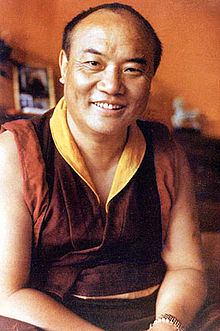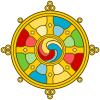Karmapa
| Karmapa | |||||||||
 The 16th Karmapa, Rangjung Rigpe Dorje (1924 – 1981) | |||||||||
| Tibetan name | |||||||||
|---|---|---|---|---|---|---|---|---|---|
| Tibetan | རྒྱལ་དབང་ཀརྨ་པ་ | ||||||||
| |||||||||
| Chinese name | |||||||||
| Traditional Chinese | 噶瑪巴 | ||||||||
| Simplified Chinese | 噶玛巴 | ||||||||
| |||||||||
| Part of a series on |
| Tibetan Buddhism |
|---|
 |

The Gyalwa Karmapa (honorific title: His Holiness the Gyalwa (རྒྱལ་བ་, 'Victorious One') Karmapa, more formally as Gyalwang (རྒྱལ་དབང་ཀརྨ་པ་, 'King of Victorious Ones') Karmapa, and informally as the Karmapa Lama) is the head of the Karma Kagyu, the largest sub-school of the Kagyu school (Tibetan: བཀའ་བརྒྱུད, Wylie: bka' brgyud), itself one of the four major schools of Tibetan Buddhism. The Karmapa was Tibet's first consciously incarnating lama.
The historical seat of the Karmapas is Tsurphu Monastery in the Tolung valley of Tibet. The Karmapa's principal seat in exile is the Dharma Chakra Centre at Rumtek Monastery in Sikkim, India. His regional monastic seats are Karma Triyana Dharmachakra in New York and Dhagpo Kagyu Ling in Dordogne, France.
A decade after the passing of the 16th Karmapa, a controversy within the Karma Kagyu school over the recognition process of a second Karmapa occurred. The identity of the current 17th Karmapa was resolved by the Karmapas themselves, Orgyen Trinley Dorje and Trinley Thaye Dorje, both of whom issued a joint statement on 04 December 2023.[1]
Origin of the lineage
[edit]Düsum Khyenpa, 1st Karmapa Lama (Wylie: Dus gsum Mkhyen pa, 1110–1193), was a disciple of the Tibetan master Gampopa. A talented child who studied Buddhism with his father from an early age and who sought out great teachers in his twenties and thirties, he is said to have attained enlightenment at the age of fifty while practicing dream yoga. He was henceforth regarded by the contemporary highly respected masters Shakya Śri and Lama Shang as the Karmapa, a manifestation of Avalokiteśvara, whose coming was predicted in the Samadhiraja Sutra[2] and the Laṅkāvatāra Sūtra.[3]
The source of the oral lineage, traditionally traced back to the Buddha Vajradhara, was transmitted to the Indian master of mahamudra and tantra called Tilopa (989–1069), through Naropa (1016–1100) to Marpa Lotsawa and Milarepa. These forefathers of the Kagyu (Bka' brGyud) lineage are collectively called the "Golden Rosary".
Recognition of the Karmapa
[edit]The Karmapa is a long line of consciously reborn lamas, and the second Karmapa, Karma Pakshi (1204–1283), is the first recognized tulku (Wylie: sprul sku) in Tibetan Buddhism who predicted the circumstances of his rebirth.[4][5]
A Karmapa's identity is confirmed through a combination realized lineage teachers supernatural insight, prediction letters left by the previous Karmapa, and the young child's own self-proclamation and ability to identify objects and people known to its previous incarnation.[6][7][8]
Conflicts in recognitions
[edit]The 8th, 10th, and 12th incarnations, as well as the widely renowned 16th Karmapa, each faced conflicts during their recognition,[9][10] which were ultimately resolved. There is currently a controversy over the enthronement of two 17th Karmapas.
Black Crown
[edit]The Karmapas are the holders of the Black Crown (Wylie: Zhwa-nag) and are thus sometimes known as "the Black Hat Lamas". This crown (Wylie: rang 'byung cod pan "self-arisen crown"), is traditionally said to have been woven by the dakinis from their hair and given to the Karmapa in recognition of his spiritual realization. The physical crown displayed by the Karmapas was offered to Deshin Shekpa, 5th Karmapa Lama by the Yongle Emperor of China as a material representation of the spiritual one.
The crown was last known to be located at Rumtek Monastery in Sikkim, the last home of the 16th Karmapa, although that location has been subject to some upheaval since 1993 causing some to worry as to whether or not it is still there. An inventory of items remaining at Rumtek is purported to be something the Indian government is going to undertake in the near future.
List of previous Karmapas
[edit]- Düsum Khyenpa (དུས་གསུམ་མཁྱེན་པ་) (1110–1193)
- Karma Pakshi (ཀརྨ་པཀྵི་) (1204–1283)
- Rangjung Dorje (རང་འབྱུང་རྡོ་རྗེ་) (1284–1339)
- Rolpe Dorje (རོལ་པའི་རྡོ་རྗེ་) (1340–1383)
- Deshin Shekpa (དེ་བཞིན་གཤེགས་པ་)(1384–1415)
- Thongwa Dönden (མཐོང་བ་དོན་ལྡན་) (1416–1453)
- Chödrak Gyatso (ཆོས་གྲགས་རྒྱ་མཚོ་) (1454–1506)
- Mikyö Dorje (མི་བསྐྱོད་རྡོ་རྗེ་) (1507–1554)
- Wangchuk Dorje (དབང་ཕྱུག་རྡོ་རྗེ་) (1556–1603)
- Chöying Dorje (ཆོས་དབྱིངས་རྡོ་རྗེ་) (1604–1674)
- Yeshe Dorje (ཡེ་ཤེས་རྡོ་རྗེ་) (1676–1702)
- Changchub Dorje (བྱང་ཆུབ་རྡོ་རྗེ་) (1703–1732)
- Dudul Dorje (བདུད་འདུལ་རྡོ་རྗེ་) (1733–1797)
- Thekchok Dorje (ཐེག་མཆོག་རྡོ་རྗེ་) (1798–1868)
- Khakyab Dorje (མཁའ་ཁྱབ་རྡོ་རྗེ་) (1871–1922)
- Rangjung Rigpe Dorje (རང་འབྱུང་རིག་པའི་རྡོ་རྗེ་) (1924–1981)
- Ogyen Trinley Dorje (ཨོ་རྒྱན་འཕྲིན་ལས་རྡོ་རྗེ།) (b. 1985) or Trinley Thaye Dorje (ཕྲིན་ལས་མཐའ་ཡས་རྡོ་རྗེ།) (b. 1983)
See also
[edit]Notes
[edit]- ^ Orgyen Trinley Dorje and Trinley Thaye Dorje. 4 December 2023, "A joint statement regarding the reincarnation of Kunzig Shamar Rinpoche". Karmapa.org. Retrieved 14 December 2023
- ^ Khenchen Thrangu Rinpoche (January 1993). "King of Samadhi Sutra: Oral commentaries given in Rinpoche's monastery in Boudhanath, Nepal". Archived from the original on 2001-06-17.
- ^ The Lankavatara Sutra Archived 2006-01-13 at the Wayback Machine
- ^ "Karmapa Concept Encyclopedia Analysis". Collab.itc.virginia.edu. Retrieved 20 July 2020.
- ^ Wong, Sylvia (2010). "The Karmapa Prophecies". Motilal Banarsidass. p. 2. ISBN 978-81-208-3480-4.
The first master to reincarnate continuously, life after life, while keeping the same identity, was the 1st Karmpa Dusum Khyenpa (1110-1193). Before he died, the 1st Karmapa left brief oral instructions with three separate disciples concerning his next reincarnation. After his death, this first ever tulku declared himself to be the reincarnation of Dusum Khyenpa. The circumstances of his arrival corresponded to the oral instructions previously given. In addition, the 1st Karmapa's teacher Pomdrakpa saw him in a vision, and subsequently confirmed that Karmapa Dusum Khyenpa had indeed returned as Karma Pakshi, the 2nd Karmapa (1204-1283).
- ^ Thinley, Karma (1980). The History of the Sixteen Karmapas of Tibet. Prajna Press. pp. 44, 81, 89, 95, 109, 110, 113, 115, 119, 121, 125, 129. ISBN 1-57062-644-8.
- ^ Rinpoche, Shamar (6 June 2006). "Karmapa Controversy". Letter to Robert Thurman. Retrieved 29 July 2020.
Because when you recognize the reincarnation of a Lama, the past Lama's spirit had to come from Nirvana or the Bardo to a new human form. At that point, the appropriate spiritual teachers recognize it. And when one is such a spiritual leader, that Lama is recognized either by seeing it directly from one's supernatural mind, or via the prediction of one's personal yidams (white or green Tara, for example, or Dharma protectors).
- ^ Levin, Norma (2013). Miraculous 16th Karmapa: Incredible Encounters with the Black Crown Buddha. Shang Shung Publications. p. XX.
His great bequest to spiritual history was his ability to recognize his own future reincarnation, thus establishing for the first time an infallible, continuous reincarnation lineage in which he could draw upon his clairvoyance to guide beings in the present. Since then the Karmapa was frequently called upon to identify other reincarnate Lamas. To foretell his own reincarnation he would write a prediction letter before passing away and give it secretly to a trusted disciple to be opened at the right time. This letter would tell the time and place of his birth and the names of his parents, as well as the special natural signs that would occur. The letter is infallible proof that it is the spiritual lineage that reincarnates and not a dynastic blood line.
- ^ Rinpoche, Thrangu. "THE KARMAPA CONTROVERSY". Archived from the original on 2020-09-06. Retrieved 29 July 2020.
- ^ Rinpoche, Shamar (6 June 2006). "Karmapa Controversy". Letter to Robert Thurman. Retrieved 29 July 2020.
Once instance where the Dalai Lamas and the Tibetan government did try to interfere in the process of recognizing the Karmapas was during the time of the recognition of the 16th Karmapa. At that time there was a boy, the son of the finance Minister Lungshawa, whom the 13th Dalai Lama recognized as the 16th Karmapa. Karma Kagyu lamas, on the other hand, recognized a boy from the Athubtsang family of Derge. They rejected the 13th Dalai Lama's candidate, and the 13th Dalai Lama accepted that rejection and acknowledged the Kagyu chosen candidate. That candidate grew up to be H. H. Rangjung Rigpe Dorje.
References
[edit]- Official websites of His Holiness Karmapa www.karmapa.org or www.kagyuoffice.org
- Thinley, Karma: The History of the Sixteen Karmapas of Tibet, Boulder, Prajna Press 1980.
- Douglas, Nick; White, Meryl: Karmapa, the Black Hat Lama of Tibet, Milano 1975.
- Ken Holmes, Karmapa, Altea Publishing 1995, ISBN 0-9524555-4-4. Author's website (While the book and web site favours one candidate for the 17th the information on 1st-16th is useful and was the original source for this article)
External links
[edit]The history of the Karmapa lineage, including biographical details of the historical Karmapas, can be found at the following web sites. Notice that the websites are written to those loyal to one or other of the rival 17th Karmapas, and their accounts of previous incarnations may not be written from a neutral point of view.
- Karmapa lineage history on kagyuoffice.org, the website of Ogyen Trinley Dorje
- Karmapa lineage history on karmapa.org, the website of Thaye Dorje
- The Life of the 16th Gyalwa Karmapa
- Information on past and present Karmapas from khandro.net, a website supporting Ogyen Trinley Dorje
